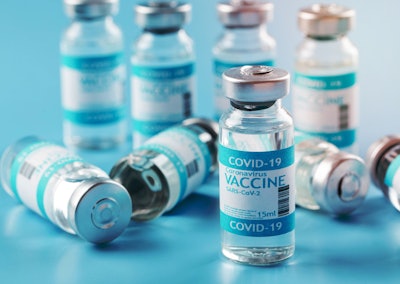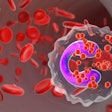
The COVID-19 vaccination significantly reduces the risk of developing respiratory type-2 inflammatory diseases such as asthma, allergic rhinitis and chronic rhinosinusitis. That’s according to a new study, “COVID-19 Infection Raises Respiratory Type-2 Inflammatory Disease Risk, Whereas Vaccination is Protective,” which was published in The Journal of Allergy & Clinical Immunology.
One of the study’s authors, Philip Curman, MD, PhD, a dermatologist and researcher at the Karolinska Institutet in Sweden, analyzed electronic health records from nearly six million adults to assess the impact of the SARS-CoV-2 infection and vaccination on these conditions.
Dr. Curman and his colleagues found that individuals infected with COVID-19 had a 65.6% increased risk of asthma, a 27.2% increased risk of allergic rhinitis and a 74.4% increased risk of chronic rhinosinusitis compared to uninfected controls. By contrast, those who were vaccinated showed a 32.2% reduction in asthma risk, along with decreased risks for allergic rhinitis and chronic rhinosinusitis.
“This bidirectional risk profile — elevated with infection and reduced with vaccination — is both clinically relevant and mechanistically intriguing,” Dr. Curman told Healio. “The results are consistent across multiple sensitivity analyses, suggesting that infection may trigger and vaccination may help prevent type-2-driven respiratory complications.”
The study used propensity-score matching to compare infected, vaccinated and control groups, ensuring robust statistical comparisons. Notably, the most pronounced differences were observed between vaccinated individuals who had not been infected and unvaccinated individuals who had been infected.
The research did not find significant changes in risk for atopic dermatitis or eosinophilic esophagitis, suggesting that the immune response may be largely confined to the respiratory tract.
“This points to organ-specific mechanisms, possibly reflecting higher viral loads or immune activation in respiratory tissues compared to skin or the gastrointestinal tract,” Dr. Curman said. “Understanding this specificity may help refine both mechanistic hypotheses and targeted prevention.”
Researchers emphasized the importance of vaccination not only for preventing severe COVID-19 but also for mitigating downstream respiratory complications. They encouraged clinicians to monitor patients closely for asthma and other respiratory conditions following infection, especially those with pre-existing vulnerabilities.
Dr. Curman and his team are now expanding their research to include psoriasis and other immune-mediated diseases, using similar real-world data analytics.






















